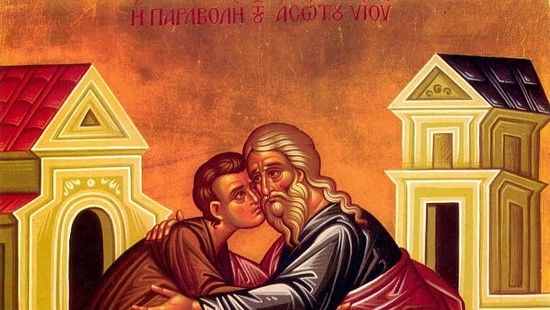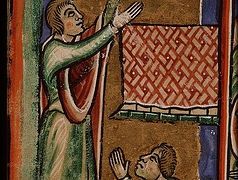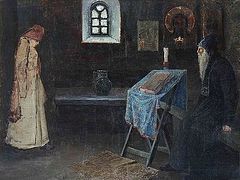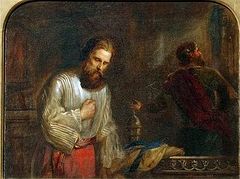Source: Orthodox Christian Network
February 26, 2016
[The Older Son] answered his father, “Lo, these many years I have served you, and I never disobeyed your command; yet you never gave me a kid, that I might make merry with my friends. But when this son of yours came, who has devoured your living with harlots, you killed for him the fatted calf!” And he said to him, “Son you are always with me, and all that is mine is yours. It was fitting to make merry and be glad, for this your brother was dead, and is alive; he was lost, and is found.” Luke 15: 29-32 (Gospel on the Sunday of the Prodigal Son)
In the Parable of the Prodigal Son, there are three main characters—the younger son, who made a mess of his life, but then returned and repented; the father, who acquiesced to the wishes of his younger son, gave him his share of the inheritance, and who was ready to forgive and restore his son when he came home; and the older son, the one “who never left.”
The Parable leads us to surmise that the father was a farmer, as the older son was working out in the field. Presumably, the younger son was sharing the burden of the work prior to his leaving. The older son had plenty of reason to be angry at his brother—His brother had first and foremost, insulted their father. Secondly, he had cut his father’s wealth in half by taking his inheritance early. Third, he had left the older brother to do the work of both brothers, so he had increased his labor. As if this wasn’t enough, when the younger brother came home, the father not only forgave him, but threw a party in his honor. Yet, when we read the parable, it is the older son who we end up with a bad picture of, not the younger son.
So, what is the lesson here? First, when the older brother said to his father “I never disobeyed your command,” that was not a true statement. No child can ever say that he never disobeyed his father. I was a relatively good child, but I wasn’t perfect. I’m sure there were plenty of times I disobeyed my father. And if, in the Parable, the Father represents GOD our Father, then to say we never disobey God is not a true statement for any of us. In fact, it is the height of arrogance.
In some sense, we are all the Prodigal Son. We all “waste” our inheritance when we sin. We all “go away” to a “far country” when we sin because we estrange ourselves from God. Like the Prodigal Son, however, we hopefully have moments where we “come to ourselves” and repent, we come back to God. And God our Father forgives us and restores us when we come back to Him.
So, when are we like the older son? There are two instances—first, when we are so arrogant as to think we never do wrong. This puts us in the same place as the Pharisee, in the Parable of the Publican and the Pharisee. It fails to show humility.
And second, when we look on those “who come back” with contempt, rather than joy. This happens more than we think. When a person makes a mistake and owns up for it, we sometimes think about retribution and punishment before we think about forgiveness. When we feel that a person has been too easily forgiven and hasn’t been thoroughly punished, we tend to become indignant with them. We fail to show mercy.
There is nothing wrong with the loyalty of the older son. The fact that he was obedient to his father, at least most of the time, was a good thing. But no one is obedient all the time. And when a lost soul has returned home, we should be rejoicing.
In practical terms, periodically we see someone come back to church after a long absence. What is our reaction? Are we contemptuous, like “where have you been?” Or are welcoming, without interrogating? How many times in life does someone who has wronged you try to make amends, perhaps even after a long time—it probably doesn’t happen often but it does happen. Are we easy to forgive and easy to entreat, like the Father in the story? Or are we filled with anger and contempt, like the older son?
If God our Father is ready and happy to restore us, we should be happy to restore one another. After all, no one has sinned against me MORE than I have sinned against God. So, if I expect God to forgive ALL of my sins, then I should be willing to forgive the sins of others. And I should rejoice, rather than resent, when someone “comes back” and “makes it right.”
I have exhausted the wealth of my father’s holdings, and have consumed them; I have become destitute, dwelling in the land of wicked citizens. No longer able to bear their company, I return and cry to You, the compassionate Father, “I have sinned against heaven and before You, and I am not worthy to be called Your son. Treat me as one of Your hirelings, O God, and have mercy on me. (From the Praises of the Orthros on the Sunday of the Prodigal Son)
See the good in people today!




